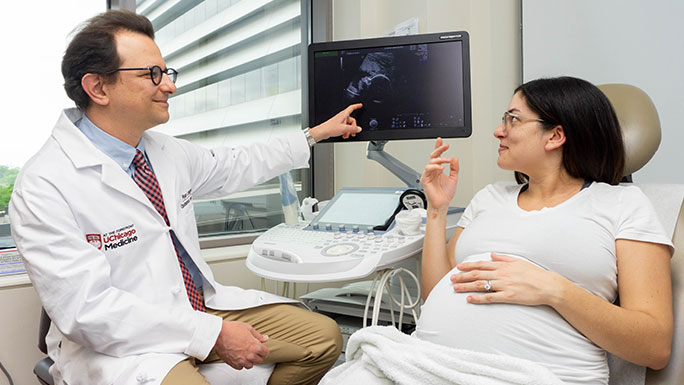Genetic Screening and Counseling Before and During Pregnancy

Prenatal Diagnosis and Reproductive Genetics
The science of genetics can get complicated — and may seem scary, especially when it involves your baby’s health. At the University of Chicago Medicine, our experienced prenatal and reproductive genetics team will educate you about various types of genetic disorders and your baby’s risk. We can answer all your questions, provide the most advanced genetic testing and help you sort through complicated emotions and decisions.
Reasons to Consider Genetic Screening and Counseling
An important question to consider before and during pregnancy is whether you and your baby should get genetic testing and counseling. Gene mutations can cause thousands of diseases, health conditions and birth defects, including cystic fibrosis, Down syndrome, inherited heart diseases, hemophilia and sickle cell disease. Some gene mutations are passed down through families while others occur randomly.
Genetic testing and counseling can be informative before or during pregnancy, helping you to understand your baby’s risk and plan ahead. The risk of having a baby with certain genetic disorders, such as Down syndrome, increases with age. Patients who have had multiple miscarriages may also want to see a genetic counselor. Two thirds of miscarriages are due to genetic factors.
What to Expect at Your First Visit
During your first appointment — which can be face-to-face or virtual — we will talk to you about potential risk factors for genetic disorders. We will go over your and your partner’s medical history, including your age, past miscarriages, lab test results, health conditions, allergies and medications. We will also create a detailed family medical history that plots out any diseases and conditions that have affected your parents, children, siblings, grandparents, and other relatives. This will help us identify any trends in inheritable diseases that may run in your family.
Based on this assessment, we can tell you whether your baby might be at risk for any genetic concerns and what genetic tests are available to help us better determine your baby’s risk of having a genetic disorder. Our main goal is to give you the information you need to make informed choices about your pregnancy and your baby’s health.
State-of-the-Art Genetic Testing and Screening
At UChicago Medicine, you will have access to a comprehensive array of genetic tests.
Performed before or during pregnancy, these lab tests can determine whether the mother or father carry genes that cause birth disorders. Using advanced carrier testing approaches, we can screen up to 500 genes from a single parent’s sample of blood, saliva, or cells rubbed off from inside of the cheek.
An ultrasound of the heart, called a fetal echocardiogram, can be ordered to evaluate babies in the womb for any congenital heart defects. One of our experienced pediatric cardiologists at Comer Children’s Hospital will interpret the test and explain the results to parents. A family history of birth defects of the heart can increase the risk of a baby having a heart condition. Families with histories of congenital heart disease should consider genetic counseling and fetal echocardiograms.
Patients can get three different screening tests during pregnancy (see below). These screening tests only provide a probability that a condition exists. It’s important to get genetic counseling to determine which test is best for you and your pregnancy.
- First trimester screening at 10 to 14 weeks: An ultrasound exam and blood test to provide information about the chances for your baby to be affected by either Down syndrome or trisomy 18 (a genetic abnormality of chromosome 18, which results in multiple birth defects).
- Second trimester quad screening at 15 to 22 weeks: A blood test, typically performed in your primary obstetrician’s office, to measure the levels of four serum anylates produced by the pregnancy and found in the mother’s blood. Anylate levels help calculate the chance of a baby being born with Down syndrome, trisomy 18 or other birth defects.
- Cell-free fetal DNA testing at 10 weeks or after: During pregnancy, DNA from the fetus and placenta can be found in the mother’s blood. Thus, by testing the mother’s blood during pregnancy, we can predict the baby’s risk of having certain types of genetic disorders, including Down syndrome, trisomy 18 (an extra chromosome 18), trisomy 13 (an extra chromosome 13), sex chromosome abnormalities (extra or missing X or Y chromosomes) and other birth defects. Cell-free fetal DNA testing can be performed as a primary screening test or after an abnormal first or second semester test.
Fetal Diagnostic Genetic Testing
While screening tests only give a probability that your baby has certain types of genetic conditions, diagnostic testing can tell you with almost 100 percent certainty whether your child has that condition. There are a number of reasons to consider having a diagnostic fetal genetic test: your age, family history, an ultrasound finding, an abnormal blood test or simply because you want more information.
If the fetus is found to have a genetic disorder, our team will provide detailed counseling about the disorder and discuss your options.
There are two types of diagnostic genetic testing.
Performed at the 11th to 13th week of pregnancy, CVS helps determine if there are chromosomal abnormalities or other genetic disorders in the fetus. Chorionic villi are tiny projections of placental tissue that have the same genetic material as the fetus. Using ultrasound technology, the physician guides either a needle through the abdomen or catheter through the cervix to obtain a small sample of the placenta. The small sample of placenta tissue is sent to the lab for testing. Risk of miscarriage is 1 in 400 with this procedure.
This test can be performed at week 15 of pregnancy or later. Amniotic fluid surrounds the fetus in the uterus. During amniocentesis, the physician inserts a long thin needle into the lower part of the abdomen below the navel. An ultrasound assists the physician in guiding the needle to a safe pocket of amniotic fluid, away from the baby. A small amount of fluid is removed, which contains living cells that have been shed from the baby. The fluid is then sent to the lab for testing. Amniocentesis carries a 1 in 500 risk of miscarriage.
Benefits of Genetic Testing and Counseling
Some families prefer not to know whether their baby is at risk for a genetic disease until the child is born, which is why these tests are always considered optional and at the discretion of the parents.
But there are major benefits to knowing whether your child is at risk for a genetic disease:
- The more information you have, the better able you will be to make informed choices.
- Your doctors will know whether your pregnancy is considered high-risk so they can arrange for any special tests and services you or your baby may need during your pregnancy and at the time of delivery.
- A prenatal diagnosis may also help the pediatric specialists who will care for the infant. Some genetic disorders can be treated during pregnancy or right after the baby is born. One example is spinal muscular atrophy. If you know your baby is at risk, you will be more likely to get the right treatment in a timely manner.
- You will have time to educate yourself about the genetic condition your baby may have and start arranging needed medical care and support services.
A Team Approach to Prenatal Diagnosis and Reproductive Genetics
Our care team includes experts in maternal-fetal medicine, medical genetics and fetal and neonatal care. Our licensed genetic counselors are trained to explain how genetics work in an easy-to-understand way, interpret genetic test results, and provide one-on-one counseling.
Our genetics team works closely with experts in UChicago Medicine’s Fetal & Neonatal Care Center, including our maternal-fetal medicine physician team and pediatric specialists at Comer Children’s Hospital. If your baby is at risk for a complex genetic disorder, such as a Down syndrome, trisomy 18, or trisomy 13, our clinicians can counsel you about your options and provide the most innovative treatments and services for you and your baby.

Ryan Longman, MD
Ryan Longman, MD, is a maternal-fetal medicine physician, director of ultrasound and genetics, and director of the Fetal and Neonatal Care Center.
Learn more about Dr. LongmanConvenient Locations for Prenatal Diagnosis and Reproductive Genetics
Request an Appointment
We are currently experiencing a high volume of inquiries, leading to delayed response times. For faster assistance, please call 1-888-824-0200 to schedule your appointment.
If you have symptoms of an urgent nature, please call your doctor or go to the emergency room immediately.
To refer a patient or to speak to someone directly, please call 773-702-6118.
* Indicates required field
